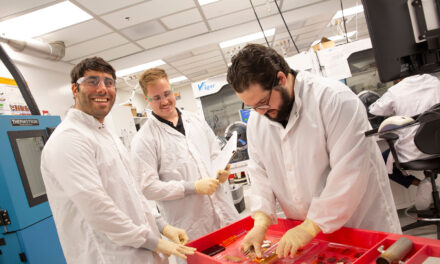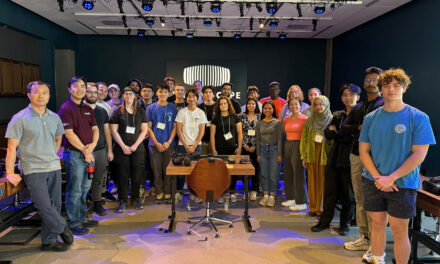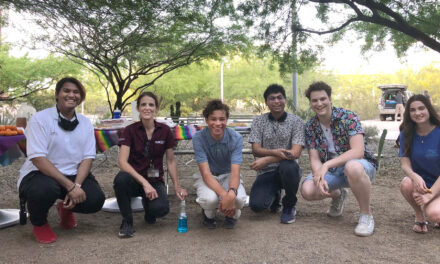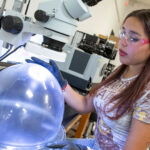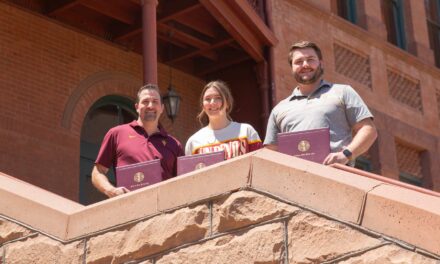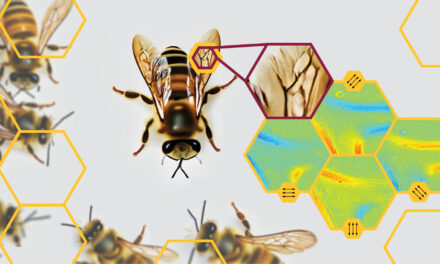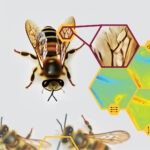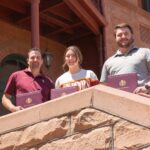
Striving to save lives on nation’s roadways
More than two decades as an ASU engineering professor paved the way for fulfilling work as an auto safety expert
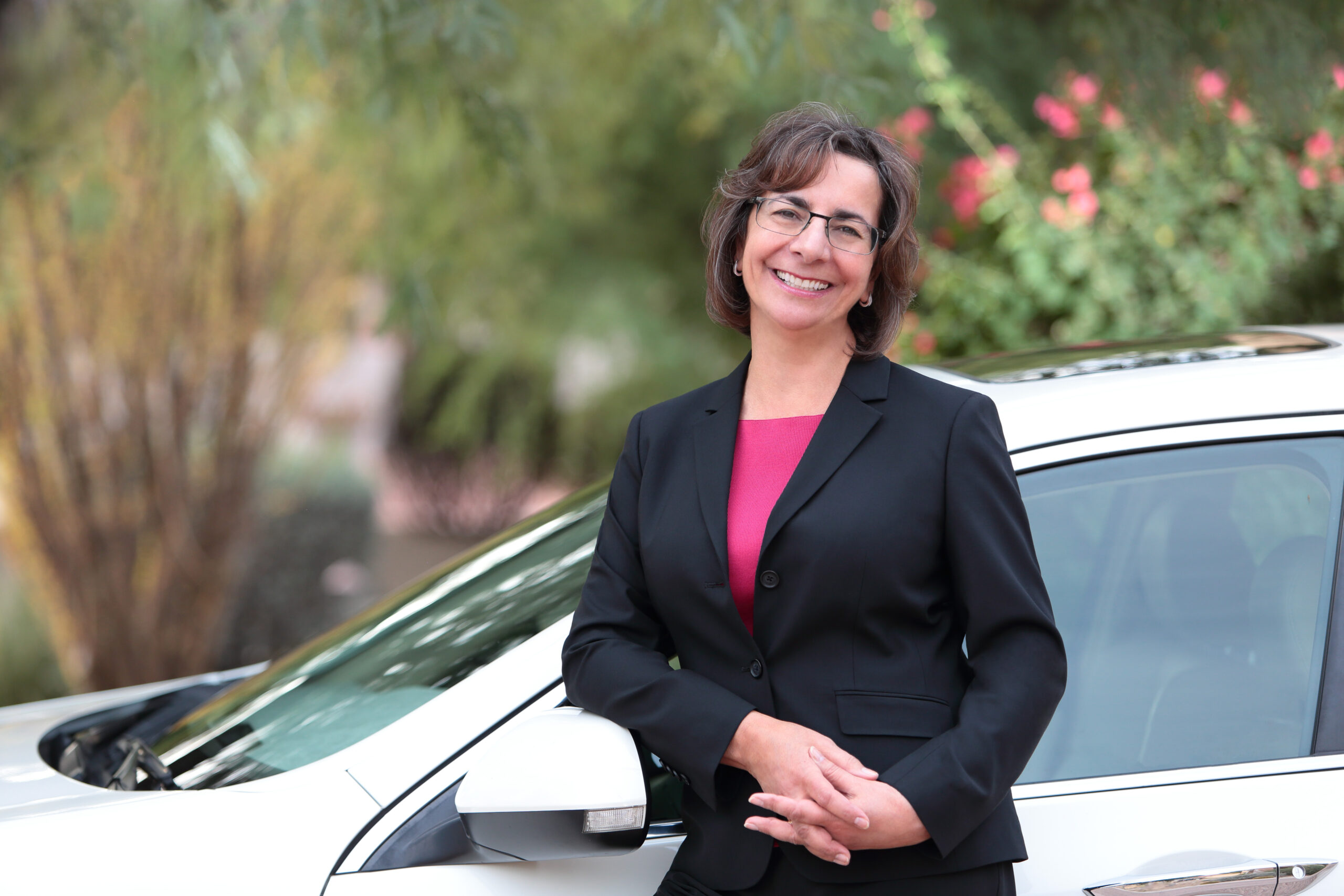
Norma Faris Hubele retired from Arizona State University in 2006 after more than two decades teaching statistics and industrial engineering, including a year as interim chair of the industrial engineering program and two years as the first director of strategic initiatives in ASU’s Ira A. Fulton Schools of Engineering.
Faris Hubele’s career began at ASU in 1984 when she became only the third woman hired to join a faculty of more than 100 engineering professors. Her trail-blazing achievements included negotiating a work-family balance with reduced teaching, research and service responsibilities while rising through the ranks to become a full professor.
Faris Hubele put herself on a path to a productive teaching and research career by earning an undergraduate degree in mathematics, a master’s degree in operations research and statistics and a doctoral degree in computer and systems engineering.
Years later, her resume highlighted the publication of more than 50 of her papers in research journals, in addition to many academic and industry conference presentations. Those accomplishments helped to open the doors to membership in the American Statistical Association, the Society of Automotive Engineering, the National Safety Council and the Association for the Advancement of Automotive Medicine.
She also coauthored the popular textbook “Engineering Statistics” with Fulton Schools Professors Douglas Montgomery and George Runger and co-edited “Statistical Process Control in Automated Manufacturing” with the now late ASU Professor Emeritus J. Bert Keats.
Upon retirement, Faris Hubele was given the honorary title of emeritus professor in what today is the School of Computing and Augmented Intelligence, part of the Fulton Schools.
So, it was time to simply rest on her laurels, right?
No, far from it.
Bringing big data to bolster consumer advocacy
Beyond her academic, research and family business accomplishments, Faris Hubele has since made her mark as the founder and CEO of TheAutoProfessor.com, which offers “car safety ratings based on real life.”
In her second career as an auto safety consultant and consumer advocate, she has worked with more than 50 legal firms across the country, served as an expert witness in more than 120 consumer-related legal proceedings and engaged in high-level debates about automotive safety standards and related issues.
The range and depth of her expertise is showcased in her book Backseat Driver, subtitled “The Role of Data in Great Car Safety Debates,” published in 2023 as part of the American Statistical Association and CRC Press Series on Statistical Reasoning in Science and Society.
In addition, Faris Hubele created Auto Grades, which provides extensive data for consumers on automobile safety systems and reports on how effectively — or ineffectively — those systems have protected drivers.
Based on automobile crash data, she has developed a system grounded in mathematics and statistics to rate the safety of more than 24,000 models of automobiles dating back to 2001 to help guide consumers’ decisions on which cars and trucks to purchase.
Among her foremost goals is to influence how the federal government conducts its automobile safety ratings tests and motivate automakers to adopt more stringent standards that will better protect the public.
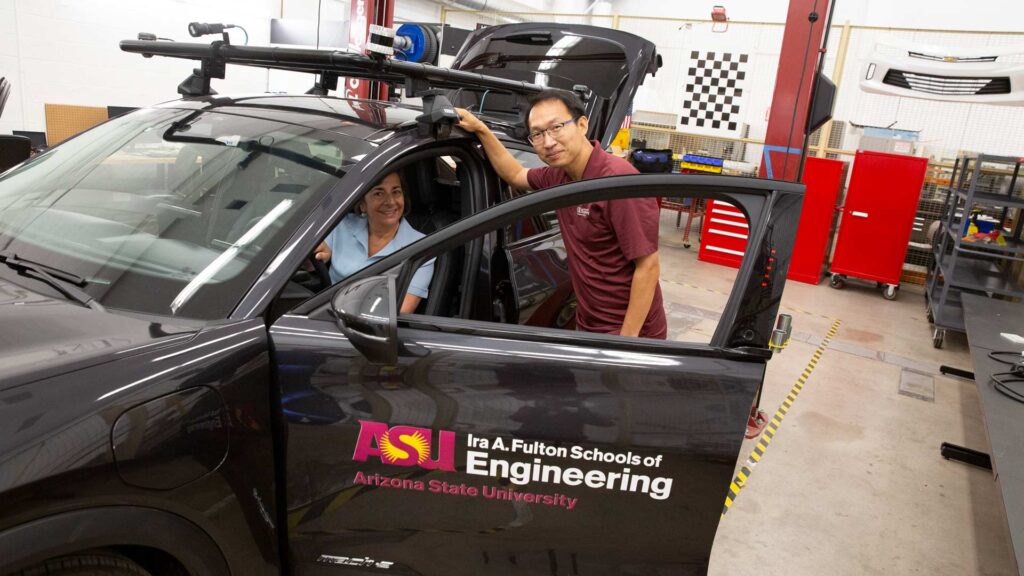
In the Simulation Building on Arizona State University’s Polytechnic campus, Norma Faris Hubele (at left) examines an automobile used by researchers in the Battery ELectric and Intelligent Vehicle Lab, directed by Junfeng Zhao, an assistant professor of engineering in The Polytechnic School, part of the Ira A. Fulton Schools of Engineering at ASU. Both Hubele and Zhao work on various efforts to improve automobile safety systems. Photographer: Erika Gronek/ASU
Aiding the cause of justice in court
Brent Ghelfi, owner of the Phoenix-based Ghelfi Law Group, which specializes in auto defect and other product liability cases, says his firm has benefitted for nearly a decade from Faris Hubele’s effectiveness as an expert witness.
Ghelfi emphasizes her contributions in analyzing dozens of cases on behalf of his clients. He notes the extensive statistical analyses of government and industry databases she has conducted to identify trends and issues related to the safety of vehicles, especially their capacity to protect occupants from severe injury during crashes.
“Norma’s deep knowledge and understanding of these issues and her ability to quickly and effectively evaluate areas of concern and pinpoint what is happening or has happened in the automobile industry is unparalleled,” Ghelfi says.
“She has advanced the cause of vehicle safety as much or more than any other expert in the field. She does her work quickly, efficiently, and effectively, and is able to defend it scientifically.” he says. “Almost as importantly, she is easy and enjoyable to work with.”
Attorney Lynn Shumway, whose Shumway Law practice in Phoenix has been doing auto safety and defect litigation for more than 30 years, says Faris Hubele has few peers when it comes to knowledge of automobile safety systems and technologies.
“I wish I could go back in time about 20 years so I would have been able to use her earlier than I did. Even among other experts, she stands out for her talent,” Shumway says.
“All the effort she has put into her writing, reports and testimony are just fantastic, and she has always been completely honest and completely correct,” Shumway adds. “I don’t think I’ve seen any experts for the opponents in a court case who’ve found anything wrong with what she’s said in court.”
Shumway says he believes Faris Hubele’s work over the years as an expert witness, along with her book and newspaper columns, have contributed to prodding some automakers to provide better safety features in their vehicles.
Collaborating with ASU automotive researchers
Faris Hubele continues to provide her expertise to support research at ASU. She recently met with researchers at the Battery ELectric & Intelligent Vehicle, or BELIV, lab, directed by Junfeng Zhao, an assistant professor of engineering in The Polytechnic School, part of the Fulton Schools.
Zhao, formerly in research and development for General Motors, now focuses on improving testing and evaluation processes for automated vehicles. His goal is to provide a rigorous framework for ensuring the reliability and safety of those self-driving automobiles by standardizing methodology for safety quantification.
Zhao says he foresees these efforts contributing to the data needed to develop safety ratings for the new vehicles equipped with advanced driver assistance systems, automated or autonomous driving systems and similar emerging technologies.
Faris Hubele sees more changes and challenges coming in automation and automotive technologies, as well as overall modes of transport.
“I think things will be evolving quickly,” she says. “So, we need to maintain some sanity to guide people through the maze of transportation evolution and safety,” she says.
For her, that evolution could mean more traffic on her website, more people contacting her for guidance on what cars to buy, more interviews on the KJZZ news (National Public Radio) and Arizona PBS news programs, azcentral.com, the Automotive News and other major media outlets, as well as more readers for her columns in the local Ahwatukee Foothills News, the Chandler Arizonan and other publications of the Times Media Group.
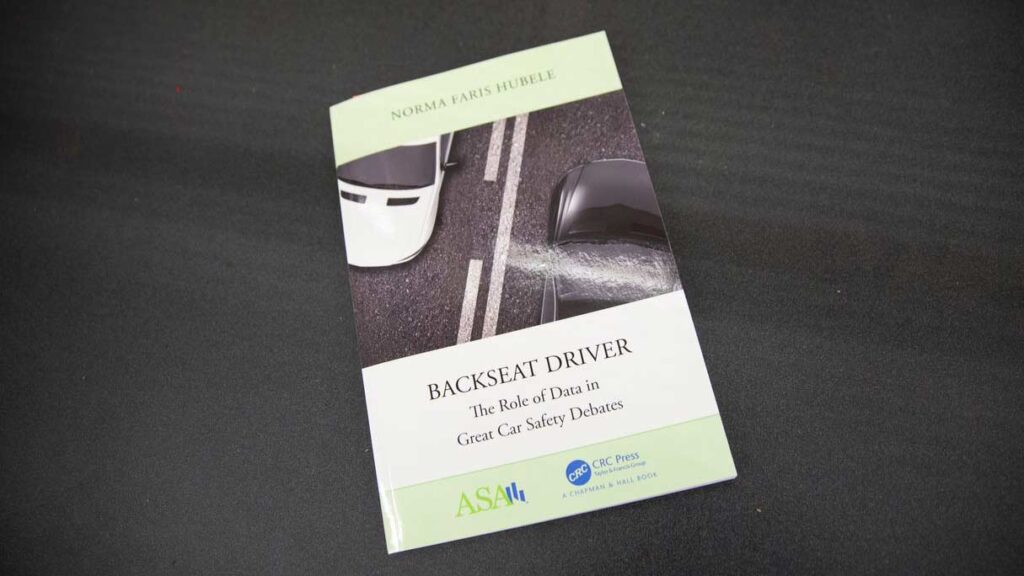
Norma Faris Hubele’s book “Back Seat Driver” focuses on the role of data in a wide cross-section of car safety controversies including defects, vehicle size, fuel efficiency, test dummies and automation. Photo from CRC Press, a Chapman & Hall Book
Challenging traditional car-safety rating systems
Faris Hubele intends to continue writing as the Auto Professor for essentially the same reason she started — to better educate families on how to ensure they are buying the safest automobiles.
She recalls a personal experience that has motivated her mission.
“I saw my baby grandson strapped into the back of a small car I knew to be unsafe,” she says.
She knew that because of the Fatality Analysis Report System, a U.S. government database of information on fatal automobile crashes.
With her in-depth knowledge of these tragedies on our nation’s roadways, she was aware that even though the vehicle in which her grandson sat had gotten a top ranking by the National Highway Traffic Safety Administration’s 5-Star Safety Rating System, it didn’t necessarily mean it was safer than other cars.
“What most car buyers don’t understand is that comparing cars of different classes the way some rating systems do is misleading,” Faris Hubele says. “A particular car may earn a four-star or even five-star rating under certain kinds of criteria in a laboratory, but in an actual crash that rating does not mean you and your family are safe.”
She touts her Auto Grades system as the only consumer-oriented safety rating system based on real crash data and not on tests using crash dummies.
“I’m challenging the traditional laboratory-based car safety rating systems and, at the same time, giving people useful, life-saving information about their cars,” she says.
“In the courtroom, I educated judges about the importance of sound statistical reasoning. Today, from my living room, I’m helping consumers,” she adds.
It’s looking as if Faris Hubele won’t be retiring from her newest career anytime soon.
“Rising through the academic ranks while balancing my family life is my proudest accomplishment,” Faris Hubele says. “Now, bringing important information to consumers about car safety is my passion.”
Husband and wife high-tech business ventures
Since 1984, Norma Faris Hubele and husband Norman Hubele have co-owned Refrac Systems, a company headquartered in Chandler, Arizona that provides industrial hot pressing and diffusion bonding for processes to fabricate intricate laminate structures.
The groundwork for the business success was set in motion when Norman Hubele earned bachelor’s and master’s degrees in engineering at ASU in the late 1970s and early ‘80s, with a focus on engineering science, nuclear and mechanical engineering.
Norman Hubele, whose expertise extends to chemical thermodynamics, fluid mechanics and energy systems, has overseen the diffusion bonding of more than three million manufactured parts during his nearly 40 years in business.
Refrac Systems, which includes the wholly owned subsidiary Die-Bond LLC, now provides tollway services in vacuum hot-pressing to a wide cross-section of industries from telecommunications, plastics and ceramic molding companies to the aerospace and defense industries and to far-flung uses in outer space and undersea operations.
The Hubeles’ family businesses provide high-vacuum hot pressing, vacuum-controlled atmosphere heat treating and conventional vacuum brazing and heat treating, along with prototyping of specialty engineering projects.
Faris Hubele’s roles have included quality control advisor and statistical analyst. But her contributions to the companies’ successes are far from her only meaningful professional endeavors during and after her time in higher education.



